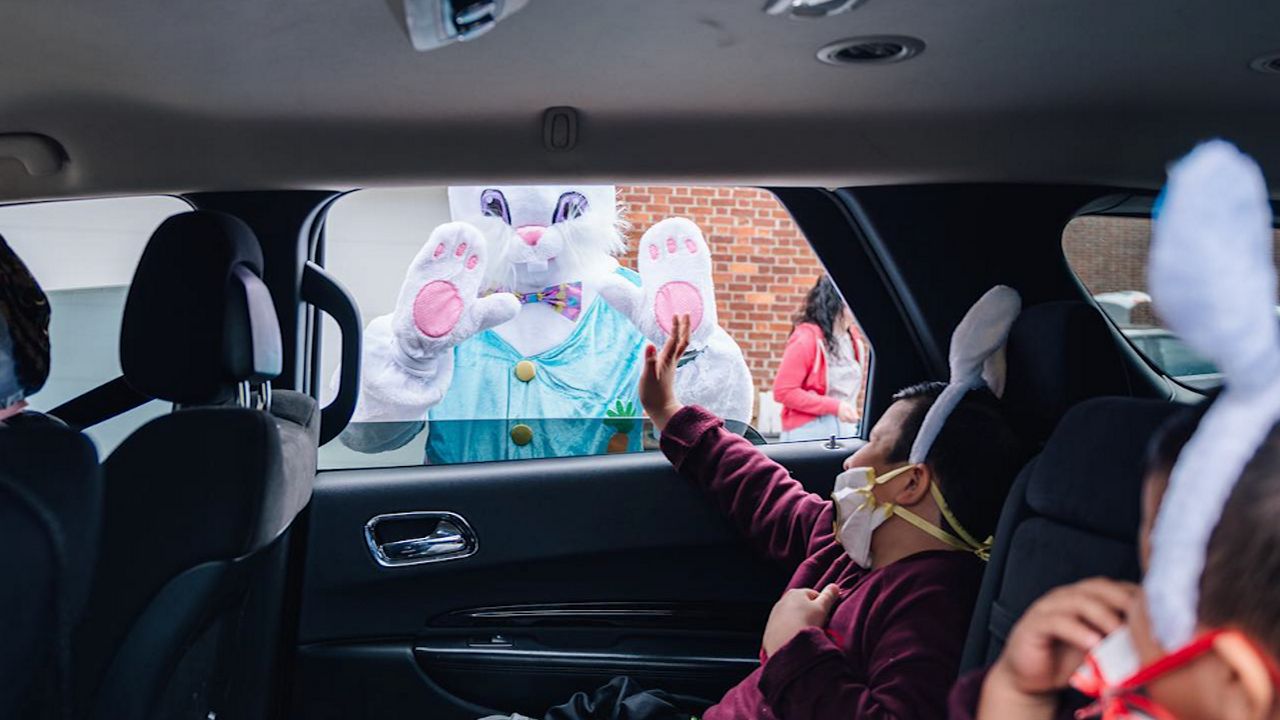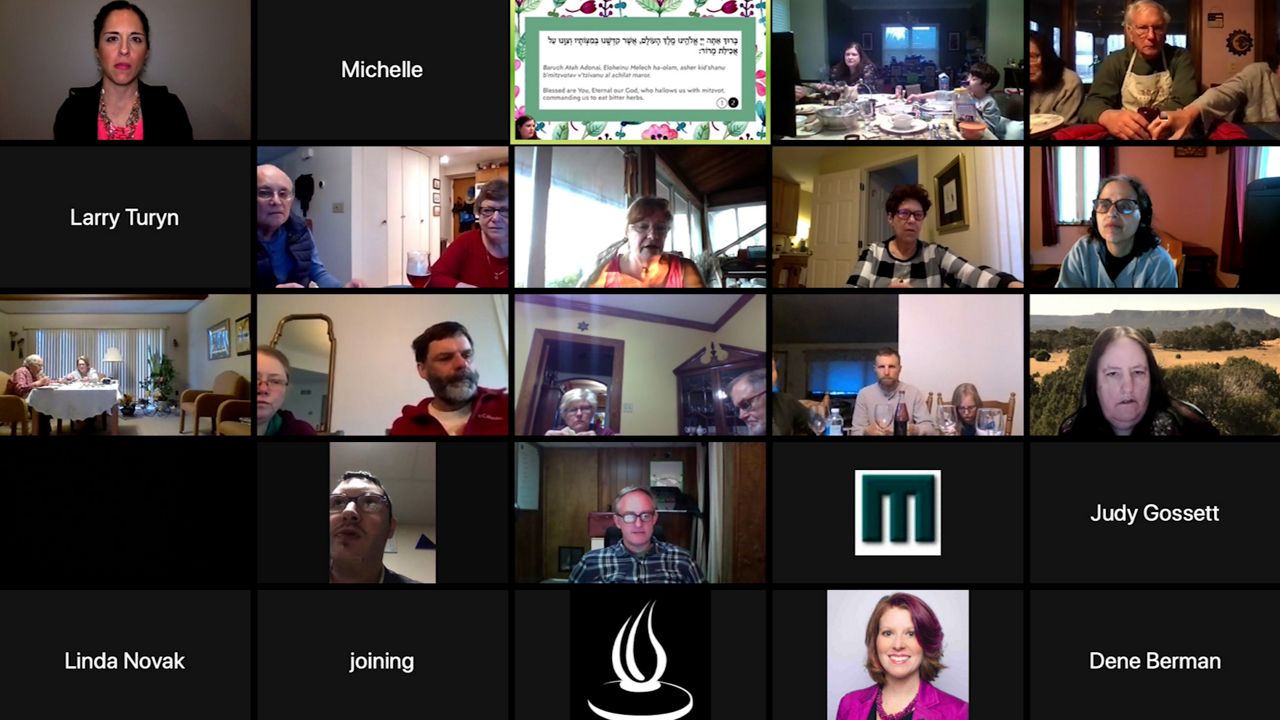CINCINNATI — Last April, Ohio’s churches were quiet. The state was just weeks into its randemic response. People stayed home and when Easter and Passover arrived, those celebrations had to reach them from a distance.
This year, the threat of the pandemic still looms but many congregations have returned to their churches and temples, albeit in smaller numbers, and as religious leaders plan their holiday celebrations, they said they’re walking a fine line between hope, excitement and safety.
At Queen City Church in Cincinnati, the Sunday energy is back. The church band leads the congregation, spaced out in Memorial Hall, through spirited refrains all in anticipation for the man backstage, Pastor Brian Cromer.
As Cromer prepares for his Easter sermon, he can’t help but reflect on where the church was last year. The church stopped meeting in-person in mid-March and its community events couldn’t go on as planned.
“If you think about it so much was taken away, it almost seemed like everyday there was another blow,” Cromer said.
That’s why he decided the church would find a way to do something to reach out to its community.
“We had to figure out something in order to be able to serve people,” he said.

They chose a drive-thru Easter egg hunt.
Volunteers with masks passed out Easter baskets to passing cars, as others held up signs calling on the congregation to keep up hope.
“Hope isn’t canceled,” Cromer said. “There’s a lot of things that were canceled last year but hope wasn’t one of those things. ”
Over the next five months, Queen City Church had no home and live-streamed all of its services. Even as other churches started resuming in-person services, Cromer couldn’t.
Until the pandemic, Queen City Church would meet at Withrow High School but since last March, Cincinnati Public Schools closed itself off to guests.
Cromer said Queen City Church looked to Memorial Hall in Over-the-Rhine. The venue wasn’t able to book performances, or use its space for concerts during the pandemic so it came to a mutually beneficial agreement with the church.
Cromer rented the place out every Sunday morning and Memorial Hall saw guests and revenue again and could put its staff to work.
Not everyone returned though. Cromer said that was expected. The services can only take in so many people and though the church has two overflow rooms and continues to livestream its services, Cromer said it’s difficult to say if the church is anywhere close to the hundreds of people who came to Queen City Church before the pandemic.
“That’s one of those things that right now, we know where some people are and others we think they’re around,” Cromer said.
In Dayton, Rabbi Karen Rodney-Halasz and Temple Israel have been coping through a similar journey.
The beginning of the pandemic coincided with Passover and Rodney-Halasz said she had to help her congregation understand how to prepare for the holiday in a new way.

“As a Rabbi, I’m constantly talking about how we’ve moved away from the type of Judaism where we used to worship at the temple in Jerusalem,” she said. “We had to learn how to pray in houses of worship and now that we can no longer pray in houses of worship, I feel like it’s a very modern understanding of what that was like to have to recreate ourselves again.”
That continued through the summer and as Rodney-Halasz helped them prepare for Yom Kippur and Rosh Hashanah, the high Holy days.
Even now, she said she feels like she needs to make plans that include both the possibility of returning to the temple while understanding she can’t guarantee it will be safe by then.
“Every time I think I understand what’s going on it changes,” she said.
Now as her congregation celebrates Passover again, Rodney-Halasz has been planning virtual events to bring people together, hosting a traditional seder over zoom on the second night of the week-long holiday.
She said she’s holding out hope they can be together soon, but she doesn’t want to move too quickly. Rodney-Halasz said she’s watching public health leaders closely and she said she’ll feel comfortable bringing her congregation back together when they won’t have to worry about rising case counts or new coronavirus variants.
“When we say next year in Jerusalem, we mean that we’re hoping it’s time for the Messianic age and that means an opportunity and a time when we can all be together and living in a peaceful world and we still pray for that. I just might use the words in person instead of Jerusalem but it all means the same to me.”
As for the size of the congregation, Rodney-Halasz agrees it’s difficult to tell, until she can see all the people she’s reaching.
“At the end of the day, those metrics are not what makes success,” Cromer said.
Instead, he’s focused on his church’s mission and the outreach he sees from his congregation to help their neighbors, feed the hungry and participate in charity.
Cromer hopes Easter though can be a return to form.
“After everything we’ve gone through in the past 12 months, I think a lot of people need Easter,” he said.
For Easter, he’s planning twice as many services so as many people can participate in person as possible. He hopes that inspires others to continue their spiritual journey and reconnect with their church community.
“I feel like we have so much Easter energy that was kind of pent up over this past year and I’m just extremely grateful for this opportunity.”



